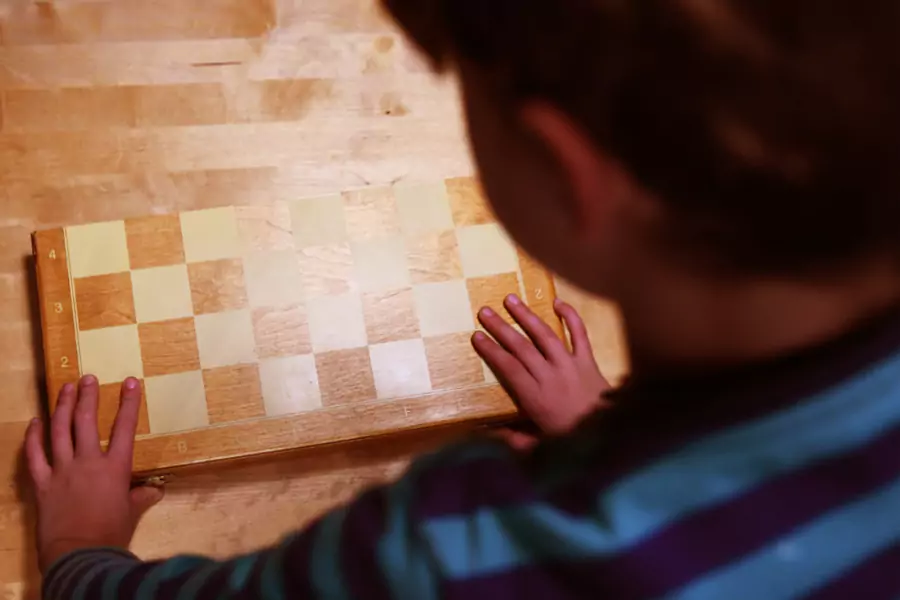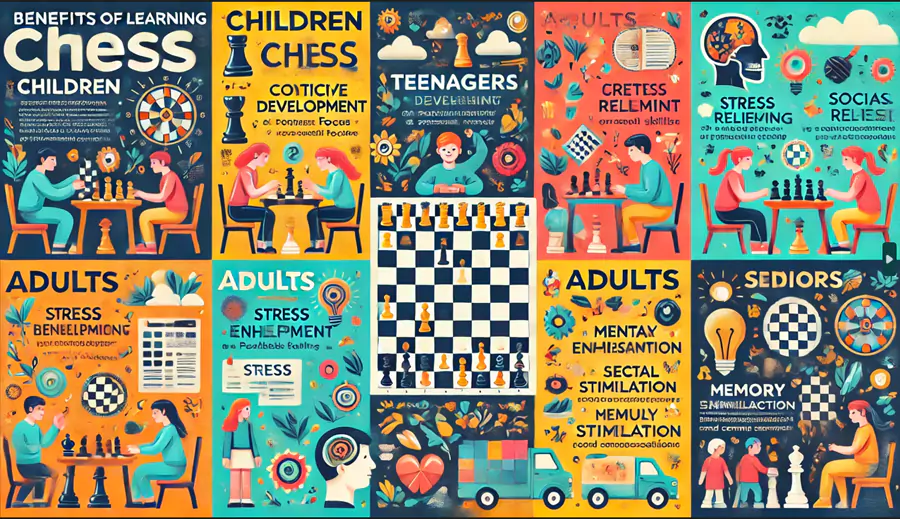What is an Ideal Age to Learn Chess?
admin
October 25, 2024
At what age should children begin learning chess? A Guide for Parents and Aspiring Players.

Chess is a timeless and strategic game that has been enjoyed by people all over the world for centuries. Its ability to improve critical thinking, problem-solving skills, and patience makes it a valuable activity for children and adults alike. However, many wonder at what age should one start learning chess? While there isn’t a specific “perfect” age as each child develops differently, research and experience have shown that starting early can bring unique benefits for cognitive and emotional development. Let’s delve into the ideal age to begin learning chess and how it can positively impact individuals at different stages of their lives.
Why start young?
Chess is more than just a game; it’s a mental workout. Starting to learn chess at an early age can bring numerous benefits, such as:
- Enhanced Cognitive Skills: The game of chess is not just a form of entertainment, but also a valuable tool for developing logical thinking, patience, and planning skills – all essential traits that can be nurtured from an early age.
- Better Academic Performance: Research has shown that children who play chess have improved performance in math, reading comprehension, and problem-solving tasks. This strategic board game not only provides entertainment but also enhances cognitive skills and academic abilities for young players.
- Improved Concentration: Playing chess can help children develop their ability to focus for extended periods, which is a valuable skill that can benefit them in academics and other aspects of life.
- Social and Emotional Skills: Chess is not just a game, it’s also a valuable tool for teaching kids important life skills. By playing chess, children learn how to handle both winning and losing with grace, which can boost their confidence, patience, and resilience.
The Ideal Age to Start Learning Chess
There’s no one-size-fits-all answer, but here’s a breakdown of how chess skills can evolve at different ages:

 Ages 3-4: Getting an Early Start
Ages 3-4: Getting an Early Start
While some may argue that it’s too early, introducing chess in a playful and low-pressure manner can have its benefits. At this age, children are already learning about shapes, colors, and spatial recognition which align perfectly with the basic pieces and moves of chess.
Teaching Tips: To start learning chess, begin by identifying the different pieces and their colors. You can also learn a simple rule, such as how pawns move on the board. It’s important to keep practice sessions short and engaging to stay focused and motivated.
 Ages 5-6: Developing Comprehension
Ages 5-6: Developing Comprehension
What to Expect: As children reach a certain age, they develop the ability to understand and retain simple rules. This makes it an ideal time for them to begin learning about chess – from how each piece moves to the objective of the game and basic strategies.
Teaching Tips: Incorporate fun chess-related games and puzzles into your lessons, keeping them to a manageable 10-15 minute timeframe. This will help reinforce the basics without overwhelming students with full games. By making learning enjoyable and bite-sized, students can develop their skills at their own pace while still having fun.
 Ages 7-8: Ready for the Full Games
Ages 7-8: Ready for the Full Games
What to Expect: As children enter this stage, they typically have the patience and comprehension to engage in complete games. They are able to handle losses gracefully and may even begin to develop strategies, comprehend concepts like check and checkmate, and plan moves ahead of time.
Teaching Tips: This is a good age to introduce friendly competitions, either with friends or online. Puzzle-solving, focusing on patterns such as forks or pins, can help sharpen their skills.
 Ages 9 and up: Strategy Development
Ages 9 and up: Strategy Development
What to Expect: As children turn 9 and older, they can start exploring more advanced strategies and long-term planning in chess. They may enjoy studying famous games or using online tutorials to improve their skills.
Teaching Tips: Introduce them to chess openings, fundamental endgames, and the significance of controlling the center. Encourage them to tackle puzzles and analyze games to enhance their skills.
The Benefits of Learning Chess at Different Life Stage

Chess is a game that can be enjoyed at any age, with each stage of life offering unique advantages for learning. For young children, starting early helps develop a natural affinity for the game. As they grow older, kids and adults alike can focus on advanced tactics and also enjoy the social and competitive aspects of chess. Let’s take a closer look at some specific benefits for different ages:
- Early Childhood (3-6): Cultivates concentration, patience, and memory.
- Elementary Age (7-12): Enhances problem-solving skills, logical thinking, and resilience.
- Teenage Years (13-18): Improves critical thinking, complex strategy, and social connections through clubs and competitions.
- Adulthood and Beyond: Boosts memory, helps prevent cognitive decline, and offers stress relief.
How to Get Started with Chess Learning
- Begin with the Basics: Introduce the names and movements of the pieces. Keep it straightforward and allow curiosity to set the pace.
- Utilize Interactive Tools: Chess apps, online platforms, and YouTube tutorials can make learning engaging and accessible.
- Join Chess Clubs or Classes: Joining community or school chess clubs provides opportunities to meet fellow enthusiasts, and experienced coaches can help accelerate your learning.
- Practice Consistently: Like any skill, chess requires practice to improve. Regular play will enhance confidence and strategic thinking.
Conclusion: Chess Can Be Enjoyed at Any Age
While it may be advantageous to start learning chess at a young age, people of any age can still learn and enjoy the game. The key factor is having a willingness to learn and find enjoyment in the process. Whether you are introducing chess to a preschooler or picking it up yourself, always remember that playing chess is an ongoing journey filled with growth, patience, and most importantly, fun. Chess is both rewarding and challenging, regardless of your age. Enjoy the learning process, and may your journey be filled with countless checkmates!

Offer online chess lessons and classes for kids, beginners, and intermediate players.
- (+91) 97890 98424
- vbschessacademy@gmail.com
- Ashtalakshmi Nagar, Valasaravakkam, Chennai, Tamil Nadu 600087
